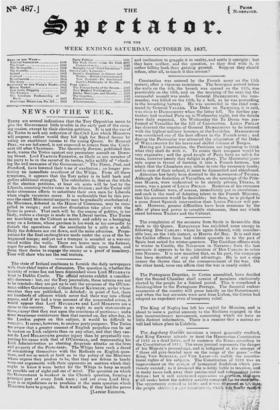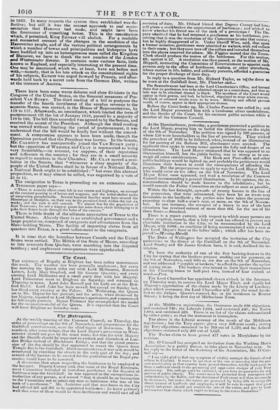The Augsburg Gazette mentions a report generally credited, that King
ERNEST intends to treat the Hanoverian Constitution of 1833 as a dead letter, and to summon the States according to the Constitution of 181). The same journal represents the danger of his Majesty's proceedings, and is indignant at the attempt of " three old gray-headed men on the verge of the grave "—the King' VON SCHEELE, and ON LEIST—to nullify the constitu- tional rights of his subjects. The Constitution of 1819 was an improvement on the system of tyrannical feudalism which pre- viously existed ; as it rendered the nobility liable to taxation, and in many cases took away their patrimonial and indeieaseupleadent juris- diction : but it still sanctioned oppression so gr`s, th*xvii of all ranks below the nobility secret v conspired Tar, +teeter The opportunity arrived in 1S30 ; and it was iptoved. so far; time the people obtaiin:4 ,..:hi.14.44finsily wife*: in 1833. In many respects the system then established was de- fecti‘e ; but still it was the nearest approach to real repre- sentation that Hanover had made, and might have been the forerunner of something better. This is the constitution which, if permitted, King ERNEnT %%ill abolish. For a readable and connected account of the .changes in the condition of the Hanoverian people, and of the various political arrangements by which a number of towns and principalities and bishoprics have been huddled up into an heterogeneous mass called the Kingdom of Hanover, we have to thank the new number of the London and Westminster Review. It contains some curious facts, little known in England, and especially interesting at the present time. One may be mentioned, which we, at least, have not before met with,—namely, that in his late attack on the constitutional rights a his subjects, Eeteeer was urged forward by Prussia, and after- wards held back by a secret note from the German Diet, written at the instance of Austria.



























